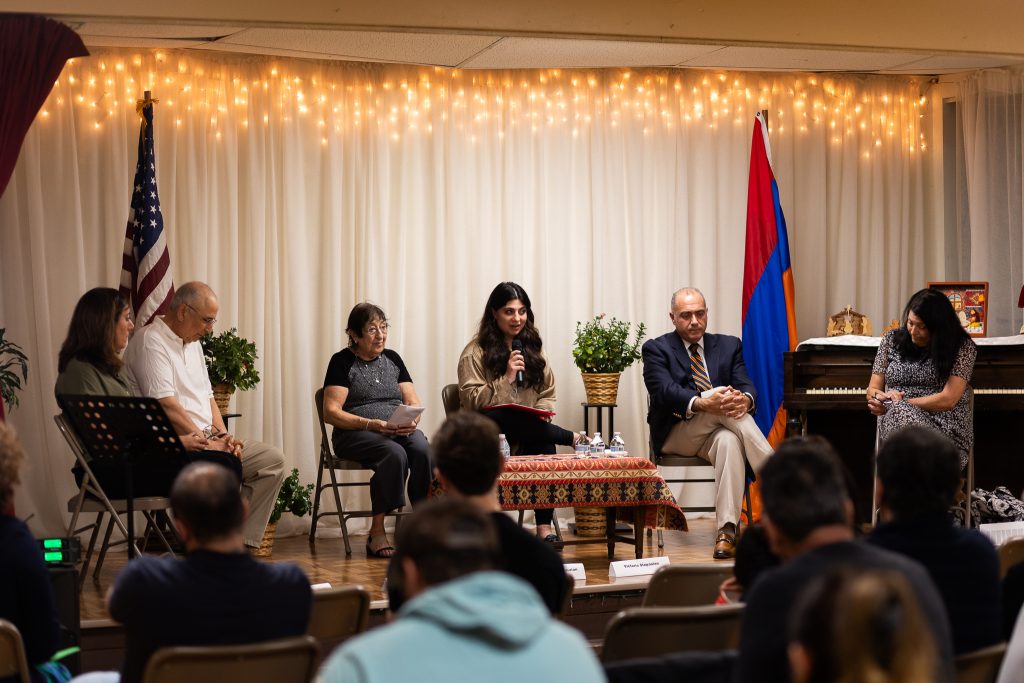Local community members gathered Tuesday evening to honor the lives of those lost in the Armenian Genocide.
Held at the St. Gregory Armenian Church, the memorial was spearheaded by the Institute for Genocide and Mass Atrocity Prevention, the Center for Middle East and North African Studies, the Russian and East European Program, the American Civic Association and members of the church. Following a few opening remarks and an Armenian song, descendants of survivors sat on a panel to share their family’s stories with attendees. They later answered questions from the audience about their experiences.
“This kind of remembrance is very important for [the] community, for collective healing, not only for the Armenian community, but also the Binghamton community and all of the people who might have a similar story who can connect or relate to Armenian stories,” said Satenik Papyan ‘20, one of the memorial’s organizers and a Ph.D. candidate in the community research and action program. “It was very important for us to also have a service component and give back to the community and show solidarity [toward] all the recent refugees that arrived in Binghamton and globally.”
The event, which was originally supposed to begin at the Armenian Genocide Living Memorial before commencing a walk, only took place at the church due to inclement weather. The panelists took turns sharing their connections to the Armenian Genocide, describing their ancestors’ experiences and the history of their lineages.
Victoria Stepanian, one of the panelists and a junior majoring in philosophy, politics and law, said her great-grandparents witnessed the genocide’s atrocities before leaving to find safety. Her father sought freedom in the United States after the 1979 Ayatollah Khomeini revolution — which established an Iranian Islamic republic — expelling him and his family from the country, where they were previously seeking refuge.
“When I speak my language I remember,” Stepanian said. “When I savor the taste of my heritage I remember. When I lay my head down each night, existing on this earth, I remember. I remember the stories of what my family endured to keep our lineage alive, the sacrifices, the escapes, the survival.”
Armenians generally mark April 24, 1915, as the beginning of the genocide. On that date, hundreds of Armenian intellectuals were arrested by Ottoman officials in Constantinople — now present-day Istanbul — with many of these intellectuals being killed in subsequent months. Conservative estimates concluded that between 600,000 to more than one million Armenians died or were killed while being forcibly marched through Eastern Anatolia.
The panelists all had ties to Binghamton and expressed comfort in finding a supportive Armenian community in the area.
Heather DeHaan, an associate professor of history at Binghamton and one of the attendees at the memorial, spoke on the importance of showing solidarity with victims of the Armenian genocide given its widespread denial which “represents another form of erasure.” DeHaan also described her current research regarding the people within Eurasia during events from “Russia’s war on Ukraine to the Azerbaijani-Armenian struggle over the territory of Nagorno Karabakh.”
In her work, DeHaan seeks to determine what it meant “historically, for people in this region to be neighbors” given both their lives and the disputes they shared.
“My goal is to remind Azerbaijanis and Armenians in particular of a time and place when, despite historic and current conflicts between these two groups, they dwelled together in relative peace, with neither community conflicts nor friendships being defined by today’s ethno-national divides,” DeHaan wrote.
At the end of the discussion, people in attendance were encouraged to ask questions. Some attendees asked what it was like for the panelists’ families when they first arrived in the United States, while others connected with the panelists in terms of the atrocities that their ancestors had also faced. One attendee asked the panel how people who aren’t of Armenian descent could honor and commemorate the genocide’s victims.
In response, one panelist, Nishan Dadian, emphasized the importance of awareness and being educated on past and current events.
“As a great statesman once said, ‘it’s not about them coming for us, it’s about them coming,’” Dadian said. “Be aware, be informed and stand up for what’s right.”



